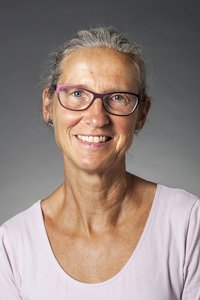Aarhus University Anniversary Foundation Research Communication Prize 2014
The Aarhus University Anniversary Foundation Research Communication Prize is awarded in recognition of outstanding and groundbreaking communication of knowledge from the university to society. The prize is accompanied by a DKK 100,000 monetary Award.
Professor Ning de Coninck-Smith: Writing history from the bottom up

For decades, Professor Ning de Coninck-Smith has brought history to life in public debate on children, their schooling and their upbringing. Her approach to history has won over a large audience, and in recognition of her efforts, she has been awarded this year’s Aarhus University Anniversary Foundation Research Communication Prize.
Everything is history, and everything can become history. Banal, perhaps. But this conception of history was far from widespread when de Coninck-Smith began her career as a historian 30 years ago. For de Coninck-Smith, professor with special responsibilities (MSO) at the Department of Education at Aarhus University, it was and remains important to write history from the bottom up. “My ambition is to emphasise the everyday life that is often written out of history,” she explains.
History in dialogue with the present
A primary focus of de Coninck-Smith’s work has been the history of childhood and education, including the architecture that forms the framework for children’s lives. She has also done work on sexuality, gender and sport that brings history in dialogue with our own times. “I want to use history to put the life we live in perspective,” explains de Coninck-Smith.
This often leads her to combine topics in surprising ways in her research, as when she includes the double bed and sexuality in the suburban single-family home in her analysis of the history of Danish housing.
In her article on Danish primary and lower secondary school after 1970 in the five-volume work Dansk skolehistorie (The history of education in Denmark) published this year to mark the 200th anniversary of the Danish folkeskole, she also adopts an unusual perspective on public debate on the school system.
“The period since the 1970s has been framed as a narrative of decline, and there’s been much discussion about what a problem the flight to private schools poses to the cohesiveness of Danish society. But private schools were just as prevalent 100 years ago, so it was only in the period 1920-70 that the folkeskole had a kind of monopoly,” explains de Coninck-Smith.
An objective approach
By providing a different perspective on current events, history plays a role in contemporary political debate, and de Coninck-Smith feels quite comfortable about that. “But it’s important to keep things in proportion in public debate,” she states and emphasises that she does not involve herself directly in politics. “I only express my opinions as a expert, and I avoid expressing personal opinions as far as possible,” she says.
De Coninck-Smith believes that she has a debt to society as a researcher whose work is financed by the taxpayer. Her contribution to society takes the form of books, articles, exhibits and participation in radio and TV programmes. And she considers an article in a national newspaper or the Danish schoolteachers’ journal Folkeskolen at least as important as a publication in an accredited academic journal. “It brings happiness to considerably more people, if you don’t mind me putting it that way,” she explains.
Focus on Danish public debate
This attitude is not exactly comme il faut in contemporary research policy: researchers’ publications in accredited international journals have high priority, as they directly affect how much funding a university receives from the government.
“But if I want to influence society, I have to relate to public debate here in Denmark, so it’s a major challenge that the winds are blowing in the other direction,” says de Coninck-Smith, and points to the five-volume work on the history of education in Denmark as an example.
“As far as I know, this is the first time that this kind of history has been explored. But there’s no way that we can cook these five volumes down to 15 pages in a journal to get our research out into the world.”
A privilege to work with exhibits
Nonetheless, the desire to maintain close contact to a Danish audience has not hindered de Coninck-Smith from achieving international recognition as a researcher and communicator, and she has also acted as a consultant for a number of exhibits on design and architecture for children.
She served as a consultant for the 2012 exhibit The Century of the Child at the Museum of Modern Art in New York, a Nordic version of which will be shown at Design Museum Denmark this winter. “My thinking is very material and focussed on objects, so the opportunity to work with exhibits has been a privilege. Articles can so easily become flat and one-dimensional. For example, the history of sexuality is one of the most boring things in the world because the sensory experiences are impossible to capture in a text. On the contrary, exhibits give us back our senses because you can move all the way around the objects on display and maybe even pick them up,” explains de Coninck-Smith.
Pulling out all the stops
The award winner is also a member of the steering group for the Skole i 200 år (School for 200 years) anniversary committee that is arranging events and activities to mark the 200th anniversary of the introduction of compulsory education in Denmark. Many of these events and activities are aimed at teaching schoolchildren at all levels about the history of education. The anniversary will culminate in the second week of October with a theme week and a competition to win a school party that all schools are eligible to participate in. “We’re pulling out all the stops, so it’ll be popular history at its very best”, says de Coninck-Smith.